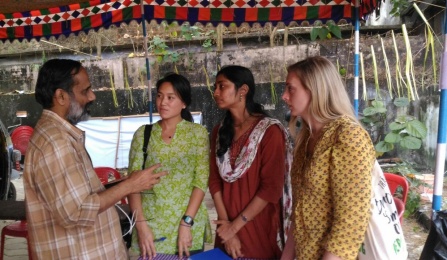MSIDGH - The Program
The interdisciplinary M.S. in International Development and Global Health motivates and capacitates students to work with government agencies, international non-government organizations (INGOs), and private companies. The 36-credit program prepares graduates to work across a variety of sectors—e.g., health, housing, equity and social justice, and education—to address grand global challenges. The program can be completed in one year, and is designed for both recent post-graduates from all majors and working professionals seeking to advance their careers. Students gain core competencies in international development and global health, and gain hands-on experience through field placements, related to sectors such as water and sanitation, food and nutrition, or health in resource-poor settings.
As a student, what you will be studying in the program?
Important student learning scope and outcomes associated with our program
- Causes of morbidity and mortality around the world, and how the risk of disease varies with regions.
- Strategies used to reduce disparities in global health.
- Research the health status of populations using available data.
- Compare different national health systems, including their contexts and strengths/limitations.
- Examine major social, economic, and environmental determinants of health.
- Study context influences perceptions of health and disease, as well as health outcomes.
- Review global trends (economics, climate, etc.) impact human health across the globe.
- Examine the relationship between health and access to and quality of water, sanitation, food, and air.
- Compare international development goals, policies, and processes across the globe.
- Define the core concepts of financing and managing international development projects.
- Compare strategies for creative, cross-sector problem solving and innovation.
- Compare models of leadership and community engagement.
- Work with international partners to build capacity and co-create strategies for improving health and development outcomes.
- Apply skills in analyzing secondary quantitative and qualitative data.
- Apply skills in writing reports.
- Apply skills for delivering verbal presentations to stakeholders.
- Apply skills in designing and evaluating interventions.
- List the ethical considerations of global health and international development projects.
The program aligns with SUNY’s goals of promoting a healthier New York and nurturing cross-national partnerships. The program also aligns with the tripartite mission of the Community of Excellence in Global Health Equity (CGHE)—research, education, and engagement.
The Center for Global Health Equity, is a strategic investment of the university, ascribes to four guiding principles: equity-driven, impact-oriented, stakeholder responsive, and interdisciplinary. The curricular structure expresses these values, and is particularly noteworthy in the way that it brings together the health sciences with other disciplines, such as urban planning and geography. This program does not duplicate any current or planned programs at UB, though it draws on many courses currently offered across decanal units. Indeed, as is the case with all interdisciplinary programs, cooperation across several academic departments has been necessary. In developing the program, we canvased programs across the central and eastern United States. We also contracted an outside consultant (EAB) to conduct market analyses and interview directors of global health and development master’s programs in the United States and Europe. As seen in the United Nations Sustainable Development Goals (SDGs), achieving health equity is a global ambition for 2030. Intertwined with health, the SDGs call for alleviating poverty and hunger, improving education and gender equality, and developing more sustainable cities and communities.
Curriculum Outline (note courses may be adjusted)
General Education courses:
Requirements in Global Health (3 credits)
EEH 500 Introduction to Epidemiology (3 credits)
EEH 521 Global Health (3 credits)
CHB 523 Introduction to Program Planning and Evaluation (3 credits)
One from the following or as approved by the advisor:
CHB 501 Study of Health Behavior (3 credits)
CHB 502 Health Behavior Change (3 credits)
CHB 522 Refugee Health for Populations (3 credits)
EEH 550 Environmental Health (3 credits)
EEH 573 Epidemiology of Infectious Disease (3 credits)
EEH 574 Epidemics and Outbreaks (3 credits)
Core Requirements in International Development:
URP 576 Comparative International Development Planning (3 credits)
URP 538 Economic Contexts and Concepts of Planning (3 credits)
END 557 Creative Problem Solving for Global Challenges (3 credits)
One from the following or as approved by the advisor:
URP 510 Planning Concepts and Controversies (3 credits)
URP 523 The Politics of Water (3 credits)
URP 568 Environmental Planning and Policy (3 credits)
URP 604 Community Food Systems Planning (3 credits)
URP 605 Built Environment and Health (3 credits)
Field Experience
URP 599 Independent Study (6 credits)
URP 545 Internship (6 credits)
Total 36 Credits
Courses
Develop versatile skills with our courses: focused, practical, and relevant
